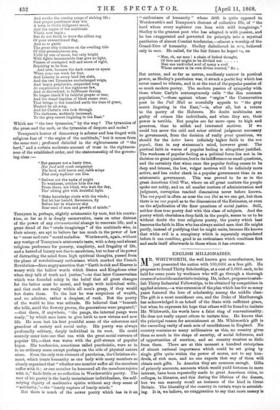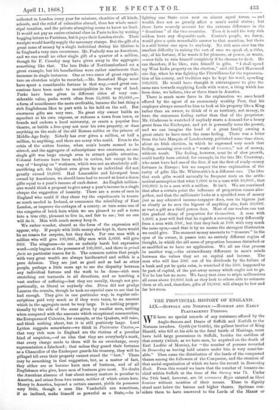ENGLISH MILLIONAIRES.
MR. WHITWORTH, the well known gun manufacturer, has just presented the nation with 100,0001. as a free gift. He proposes to found Thirty Scholarships, at a cost of 3,0001. each, to be held for some years by workmen who will go through a thorough course of scientificand artistic training. He, in fact, proposes toestab- lish Thirty Industrial Fellowships, to be obtained by competition in applied science,—a wise extension of the plan which has for so many years fostered the love of scholarship among the middle class- The gift is a most munificent one, and the Duke of Marlborough has acknowledged it on behalf of the State with sufficient grace, but when he expresses his hope that others will be found to imitate Mr. Whitworth, his words have a faint ring of conventionality. He does not really expect others to imitate him. He knows that the principal reason for astonishment at Mr. Whitworth's gift is the exceeding rarity of such acts of unselfishness in England. No country contains so many millionaires as this, no country gives them so much in the shape of security, of social deference, and. of opportunities of exertion, and no country receives so little from them. There are at this moment a hundred enterprises of almost national importance which could be set going by single gifts quite within the power of scores, not to say hun- dreds, of rich men, and no one expects that any of them will obtain such gifts. In America they are common enough. Gifts of princely amounts, amounts which would yield fortunes in mere interest, have been repeatedly made to great American cities, to colleges, to libraries, and this during the lifetime of the donors, but we can scarcely recall an instance of the kind in Great Britain. The liberality of the country in certain ways is astonish- ing. It is, we believe, no exaggeration to say that more money is collected in London every year for missions, charities of all kinds, schools, and the relief of calamities abroad, than her whole muni- cipal taxation, and the private almsgiving seems to know no limit. It would not pay an entire criminal class in Paris to live by writing begging letters to Parisians, but it pays their London rivals. Their receipts would hardly supply the necessary stamps. But the gift of a great mass of money by a single individual during his lifetime is in England a very rare occurrence. Mr. Peabody was an American, and we can recall no other single gift of a quarter of a million, though Sir F. Crossley may have given away in the aggregate something like that. The late Duke of Northumberland set a great example, but his benefactions were rather continuous than immense in single instances. One or two cases of great expendi- ture on churches might be recorded,--Mr. Beresford Hope must have spent a considerable fortune in that way,—and great con- cessions have been made to municipalities in the way of land. Parks have been given to different cities of very con- siderable value, parks worth often from 15,0001. to 30,0001.,- a form of munificence the more creditable, because the last thing a rich Englishman likes to part with is his hold on the soil. But enormous gifts are very rare. No great city owner builds an aqueduct at his own expense, or redeems a town from taxes, or founds and endows a local university, or erects a popular free theatre, or builds a free quay not near his own property, or does anything on the scale of the old Roman nobles or the princes of Middle-Age Italy. Nobody has ever given a million, or half a million, to anything, and there are many who could. Even in the crisis of the cotton famine, when men's hearts seemed to be stirred, and the aggregate of subscriptions was enormous, no one single gift was large enough even to attract public attention. Colossal fortunes have been made in cotton, but except in the way of " keeping on " workmen, which was not an absolutely self- sacrificing act, the highest sum given by an individual did not greatly exceed 10,0001. Had Lancashire and Liverpool been owned by Americans, we should have had to record at least a dozen gifts equal to a year's income of each donor. An English million- aire would think a proposal to give away a year's income in a single cheque the suggestion of insanity. There are a score of men in England who could if they chose try the experiments in tenure so much needed in Ireland, or commence the rebuilding of East London, or improve the cottages of a county, or turn some one of the congeries of brick huts which we are pleased to call a town into a true city, pleasant to live in, and fair to see ; but no one will do it. Men with much money keep it.
We rather wonder, absurd as the form of the expression will appear, why. If people with little money also kept it, there would be no reason for surprise, but they don't. For one man with a million who will give 100,0001., fifty men with 5,0001. will give 500/. The stinginess—to use an unfairly harsh but expressive
word—only begins at the possessor of 100,0001., and there is prima facie no particular reason for it. The common notion that people with very great wealth are always hardhearted and selfish is a pure delusion. They are just as good and as bad as other people, perhaps a little more apt to see the disparity between any individual fortune and the work to be done—rich men stretching out tentacula in all directions, and so touching a vast surface of suffering—but they are usually, though not pro- portionally, as liberal as anybody else. Dives did not grudge Lazarus the crumbs, though he took no especial care to see that he had enough. They give in one particular way, in regular sub- scriptions paid very much as if they were taxes, to an amount which in the aggregate must be very large. It is nothing propor- tionally by the side of the sums given by smaller men, nothing when compared with the amounts which exceptional communities, the Europeans of Calcutta, for example, or the Quakers, will raise, and think nothing about, but it is still positively large. Lord Lytton suggests somewhere—we think in Pisistratus Carton,— that very rich men in England are the victims of a peculiar kind of suspicion,—of an idea that they are everybody's mark, that every charge made to them will be an overcharge, every representation a falsehood ; that unless they guard their fortunes as a Chancellor of the Exchequer guards his treasury, they will be pillaged till even their property cannot stand the " loot." There may be something in that suggestion, but, as a matter of fact, they either are or become keen men of business, and of all Englishmen who give, keen men of business give most. No doubt the American absence of fear about money matters is peculiar to America, and arises from two causes, neither of which exists here. Money in America, beyond a certain amount, yields its possessor very little, though a man like Vanderbilt can sometimes, if so inclined, make himself as powerful as a State,—he is
fighting one State even now on almost equal terms, — and wealth does not so greatly affect a man's social statics ; but these facts scarcely account for the extreme difference in the " donations " of the two countries. Then it is said the very rich seldom have any disposable cash. Coutts's people, we fancy, would give a quite remarkable answer to that assertion, but there is a still better one open to anybody. No rich man ever has the smallest difficulty in raising the sort of sum we speak of, a tithe, say, of his fortune, if he wants it for pleasure, or power, or waste, —ever fails to ruin himself completely if he chooses to do it. He can therefore, if he likes, ruin himself in gifts. " I shall spend my West India property on the election," said old Lord Harewood one day, when he was fighting the Fitzwilliams for the representa- tion of his county, and tradition says he kept his word, spending 100,0001. He would have thought it extravagance to give the same sum towards supplying Leeds with water, a thing which has been done, we believe, two or three times in America.
There is much more force in the explanation we once heard offered by the agent of an enormously wealthy Peer, that his employer always seemed to him to look at his property like a King rather than an owner, to think of it as territory, not money, to have the statesman feeling rather than that of the proprietor.
Mr. Gladstone is wretched if anybody starts a demand for a heavy grant from the Exchequer, and yet is personally none the poorer, and we can imagine the head of a great family owning a great estate to have much the same feeling. There was a letter from the late Marquis of Londonderry, published some time since, about an Irish election, in which be expressed very much that
feeling, moaning over such a " waste of treasure," not of money,
without result. The feeling, however, must be of slow growth, could hardly have existed, for example, in the late Mr. Crawshay, who must have had one of the first, if not the first of ready-money fortunes in Europe ; but we suspect the true explanation of the rarity of gifts like Mr. Whitworth's is a different one. The idea that such gifts would naturally be frequent rests on the arith- metical assumption that what 1,0001. is to a man with 10,0001., that 100,0001. is to a man with a million. It isn't. We are convinced that after a certain point the influence of proportion ceases alto- gether, and that the millionaire looks at a specified sum of money just as any educated income-taxpayer does, sees its bigness just
as clearly as he sees the bigness of anything else, feels 50,0001. as vast a gift as a third person does. Most of our readers can test this gradual decay of proportion for themselves. A man with 1,000/. a year will find that he regards a sovereign very differently from a man with 3001., but that they look at 1001. with very mach the same eyes,,--and that is by no means the strongest illustration
we could give. The moment money amounts to " treasure " in the eyes of its owner, it passes into an entirely different region of thought, in which the old sense of proportion becomes disturbed or so modified as to have no application. We all see that process in another way,—the extraordinary difference in men's minds between the values they set on capital and income. The man who will lose 5001. out of his dividends by the failure of a bank and yet be quite calm, is wretched if the 500/. happened to be part of capital, of the put-away money which ought not to go. Yet he has lost no more. We fancy that even to triple millionaires all sums above 10,0001. look as they look to others able to estimate them at all, and, therefore, gifts of 10,0001. will always be few and far bet ween.



































 Previous page
Previous page